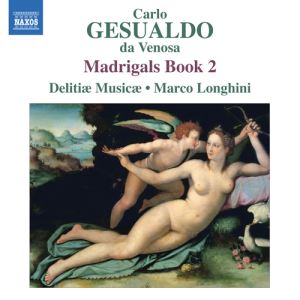 |
 |
| 

alternatively
CD: MDT
AmazonUK
AmazonUS
Sound
Samples & Downloads |
Carlo GESUALDO (1566-1613)
Madrigals - Book 2 (1594)
Caro amoroso neo [2:11]
Ma se tale ha costei [1:57]
Hai rotto e sciolto e spento [3:18]
Se per lieve ferita (part 1) [2:10]
Che sentir deve il petto (part 2) [2:43]
In piu leggiadro velo [2:06]
Se cosi dolce e il duolo (part 1) [1:27]
Ma se avverra ch'io moia [2:38]
Se taccio, il duol s'avanza [2:28]
O com'e gran martire (part 1) [2:05]
O mio soave ardore (part 2) [1:21]
Sento che nel partire [4:12]
Non e questa la mano (part 1) [1:31]
Ne tien face o saetta (part 2) [2:43]
Candida man qual neve [3:36]
Dalle odorate spoglie (part 1) [1:21]
E quell'arpa felice (part 2) [1:40]
Non mai non cangero stato [2:54]
All'apparir di quelle luci [2:40]
Non mi toglia il ben mio [2:06]
Canzon francese [6:25]
Gagliarda del Principe di Venosa [3:39]
 Delitiæ Musicæ/Marco Longhini
Delitiæ Musicæ/Marco Longhini
rec. 27-28 July, 21-25 October 2007, Chiesa di San Pietro in Vincoli,
Azzago, Verona, Italy. DDD
 NAXOS 8.570549 [56:59]
NAXOS 8.570549 [56:59] 
|
|
|
This is beautiful, intense yet measured music sung beautifully,
idiomatically and with spirit and spontaneity by Delitiæ Musicæ.
Their conductor Marco Longhini, also prepared the text and score
for this, the second CD from Naxos in a series of the madrigals
by Carlo Gesualdo, Prince of Venosa. This Book was published
in 1594 and contains almost two dozen short - none from the
main body of the Book is much longer than four minutes - pieces
with a relatively restricted range of melodic, tonal and textual
sentiments and exploration.
For all Gesualdo's famed experiments with tonality and near
dissonance, there is a stately, somewhat conservative, 'safe'
feel to the music throughout the hour of music presented here
by the respected Italian early music specialist group. They're
on ground less well-trodden that that occupied by the last three
Books of Gesualdo's six in particular. And accordingly there’s
a respect, though hardly any undue caution or reticence, on
the part of Delitiæ Musicæ in order - it seems - to expose the
music as simply as possible.
"Let's not approach it," they seem to be urging, "as
the rantings of an uxoricide and musical iconoclast who styled
his persona in Renaissance melancholy and self-indulgence."
Rather, their style recognises this gentle, communicative, very
human marriage of text and song - and instrumental accompaniment
or solo playing in half a dozen or so of the tracks - for what
it is. That's music which is undemonstrative yet full of feeling;
which follows accepted praxes yet is fresh and penetrating;
and which is completely able to carry full feelings without
relying on effect or novelty.
The performers have clearly absorbed these madrigals' many qualities
successfully; one waits in keen anticipation for the later Books
in the series. It would perhaps have been better for Naxos to
have released a double set of Books I and II since they were
both published at almost the same time. What's more, certain
madrigals both from this and the earlier release (Book I, Naxos
8.570548 - see review)
are in (presumably) two parts but one or the other only is to
be heard each time. To compensate, the music is of sufficient
weight and drive for us to find each piece wholly satisfying.
Gesualdo was able to squeeze from his authors' poetry just as
much as he needed for each madrigal - or, indeed, each type
of madrigal - to make its impact. He never pulled the texts
too thin. Interestingly, only Tasso, Guarini and Alfonso d'Avalos
- the grandfather of Gesualdo's first wife, who was also his
cousin - have been positively identified as having provided
texts for the composer.
They're secular texts, distilled, intense and minimal. Yet for
the maximum impact and enjoyment they require just the delicacy
and sensitivity which these six singers (two countertenors,
two tenors, baritone and bass) bring to the music. Their stylishness
clearly extends to humour and awareness of the oddities of Gesualdo's
existence, and his art. Yet the singers are never tempted to
mock or distance themselves from it and its reputation. For
the most part, they could be performing it for the first time.
There are even some appropriately rough (not ragged) round the
edges passages when syllables and timing take on a life of their
own in the interests of realism.
Books III and IV are already in the works: the liner notes (which
contain the full texts of Book II in Italian and English) refer
to Naxos 8.572136/7. That's when the fireworks will begin; harmonic
lines will squirm and chordal writing will stretch. Until then,
this Book II, while it sees no need to keep any lids on, is
unhistrionic and dour. Which is just what the music needs. The
acoustic is close and helpful to the music.
Alternatives? The Gesualdo Consort's recording with Harry Van
der Kamp on CPO 777 138 contains Books I, II and III and makes
an excellent comparison; their pace is quicker too. It makes
every sense to work through Gesualdo's madrigals as much in
sequence as is possible in order to arrive at a good understanding
of his world. Buy Book I and now Book II while waiting for III
and IV, it is to be hoped in 2011 on the current release schedule.
You will not be disappointed.
Mark Sealey
|
|




 All Nimbus reviews
All Nimbus reviews








